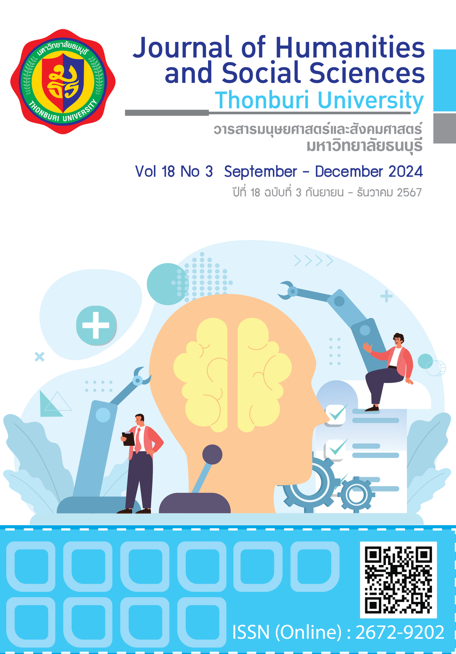Assessing the Development in Thai Tourism: Applying the Tourism Area Life Cycle
Keywords:
Thai Tourism, Tourism Development Index, Tourism Area Life Cycle, Tourism DevelopmentAbstract
This research aims to evaluate the level of development of Thailand's tourism from 2012 to 2021, according to the Tourism Area Life Cycle proposed by Butler (1980) and Coelho and Butler (2012). The study concludes that over the past decade, the development of Thailand's tourism has been in the development phase in the Tourism Area Life Cycle and has not shown a trend towards higher levels of development. Policy recommendations include: (1) implementing measures to reduce disparities or imbalances in tourism development, (2) designing tourism promotion measures considering differences in the levels of tourism development and statuses in the Tourism Area Life Cycle, and (3) encouraging tourism expansion primarily from domestic tourists to support sustainable tourism growth.
References
กระทรวงการท่องเที่ยวและกีฬา. (2566). แผนพัฒนาการท่องเที่ยวแห่งชาติฉบับที่ 3 (2566-2570).
บัณฑิต ชัยวิชญชาติ. (2563). การประยุกต์วิธีการแยกองค์ประกอบเพื่อวิเคราะห์การเปลี่ยนแปลงรายได้การท่องเที่ยวจากนักท่องเที่ยวต่างประเทศของไทย. วารสารบริหารธุรกิจ เศรษฐศาสตร์ และการสื่อสาร มหาวิทยาลัยนเรศวร, 15 (1): 8-19.
บัณฑิต ชัยวิชญชาติ. (2564). การประเมินผลกระทบภายนอกจากการท่องเที่ยวของชุมชนการท่องเที่ยวในจังหวัดท่องเที่ยวรอง. รายงานวิจัยฉบับสมบูรณ์ เสนอต่อ สำนักงานการวิจัยแห่งชาติ.
มานะ ลักษมีอรุโณทัย และ พุฒิพัฒน์ ทวีวชิรพัฒน์. (2564). การประเมินผลกระทบภายนอกจากการท่องเที่ยวในจังหวัดท่องเที่ยวรองเพื่อการพัฒนาการท่องเที่ยวอย่างยั่งยืน. รายงานวิจัยฉบับสมบูรณ์ เสนอต่อ สำนักงานการวิจัยแห่งชาติ.
Alvares, D. and J. Lourenco. (2007). Life Cycle Modelling for Tourism Areas. University of Minho. Portugal.
Andriotis, K. (2006). The Tourism Life Cycle: An Overview of The Cretan Case. Hellenic Open University, Greece.
Archer, B.H. (1980). Forecasting Demand: Quantitative and Intuitive Techniques, International Journal of Tourism Management. 1(1): 5-12.
Bamba, M. (2018). An application of Butler’s (1980) Tourist Area Life Cycle to Saly (Senegal). International Journal for Innovation Education and Research. 6(1): 47-56.
Bojanic, D. (2005). Tourist Area Life Cycle Stage and The Impact of A Crisis. ASEAN Journal of Hospitality and Tourism. 4: 139-150.
Brooks, G. (2008). Developing Guiding Principles and Policies for World Heritage and Sustainable Tourism – A Major UNESCO World Heritage Centre Initiative. in 16th ICOMOS General Assembly and International Symposium: ‘Finding the spirit of place – between the tangible and the intangible’, 29 Sept – 4 Oct 2008, Quebec, Canada.
Butler, R.W. (1980). The Concept of a Tourist Area Life Cycle of Evaluation: Implications for Management of Resources. Canadian Geographer. 24(1): 5-12.
Chaivichayachat, Bundit. (2019). The Inequality of Tourism Revenues in Thailand: City or Conglomeration. International Journal of Civil Engineering and Technology. 10 (3): 155-162.
Coelho, Julio and Richard Butler. (2012). The Tourism Area Life Cycle: A Quantitative Approach of the Tourism Area Life Cycle. European Journal of Tourism, Hospitality and Recreation. 3 (1): 9-31.
Crotts, J. C. (1996). Theoretical Perspectives on Tourist Criminal Victimization. Journal of Tourism Studies. 7: 2-9.
Dwyer, L. & C.Kim (2003). Destination Competitiveness: Determinants and Indicators, Current Issues in Tourism, 6(5): 369-414.
Fosson, A.V. and G. Lafferty. (1998). Tourism Policy and Planning: Evaluating the Life Cycle Model in Relation to Queensland and Hawaii. Policy, Organisation and Society. 16(1): 50-66.
Goodwin, H. (2017). The Challenge of Overtourism. Responsible Tourism Partnership. Working Paper.4, 1-19.
Haywood, M. K. (1986). Can the tourist-area life cycle be made operational?, Tourism Management, 7(3): 209-230.
Johnston, L. (2001). Bodies and Tourism Studies. Annals of Tourism Research, 28: 180-201.
Kruczek, Z., M.Kruczek and A.R.Szromek. (2018). Possibilities of Using the Tourism Area Life Cycle Model to Understand and Provide Sustainable Solution for Tourism Development in the Antarctic Region. Sustainability, 10(8): 1-16.
Lagiewski, R. (2006). The Application of the TALC Model: A Literature Survey. Aspects of the Tourism Area Life Cycle Vol.1 Applications and Modifications. Eds Richard Butler. Great Britain: Cormwell Press: 27-50.
Lumbanraja, V. (2012). Tourism Area Life Cycle in Lake Tabo. Indonesian Journal of Geography. 44(2): 150-160.
Mihalic, T. (2020). Overtourism and Its Socioeconomic Impacts. Annals of Tourism Research. 84: 103025.
Moore, W. and P.Whitehall (2005). The Tourism Area Lifecycle and Regime Switching Models, Annals of Tourism Research, 32(1): 112-126.
Peeters, P., Gössling, S., Klijs, J., Milano, C., Novelli, M., Dijkmans, C., Eijgelaar, E., Hartman, S., Heslinga, J., Isaac, R., Mitas, O., Moretti, S., Nawijn, J., Papp, B. and Postma, A. (2018). Research for TRAN Committee - Overtourism: impact and possible policy responses, European Parliament, Policy Department for Structural and Cohesion Policies, Brussels.
Reilly, W.J. (1931). The Law of Retail Gravitation. New York: Knickerbocker Press.
Ying, W., Y.Yang, S.Huang, L.Huang, and W.Sun. (2021). Effects of Air Quality and Weather Conditions on Chinese Tourists’ Emotional Experience, Journal of Hospitality and Tourism Management. 48: 1-9.
Zhong, L., J.Deng and B.Xiang. (2007). Tourism Development and the Tourism Area Life-Cycle Model: A Case Study of Zhangjiajie National Forest Park, China. Tourism Management. 14: 1-16.
Chaivichayachat, B. (2020). An Application of Decomposition Method for the Changing in Foreign Tourism Revenues in Thailand. Journal of Business, Economics and Communications, 15 (1): 8-19. (in Thai)
Chaivichayachat, B. (2021). Evaluation of Tourism Externalities of Tourism Community in Second-Tier Tourism Provinces. summited to National Research Council of Thailand. (in Thai)
Laksimeearunotai, M. and Taweevaciraphat, P. (2021). Evaluation of Tourism Externalities in Second-Tier Tourism Provinces for Sustainable Development in Tourism. summited to National Research Council of Thailand. (in Thai)
Ministry of Tourism and Sports. (2023). The Third National Tourism Development Plan (2023-2027). (in Thai)
Downloads
Published
How to Cite
Issue
Section
License
Copyright (c) 2024 Bundit Chaivichayachat

This work is licensed under a Creative Commons Attribution-NonCommercial-NoDerivatives 4.0 International License.
ผลงานที่ปรากฎในวารสารฉบับนี้เป็นลิขสิทธิ์เฉพาะส่วนบุคคลของผู้เขียนซึ่งต้องรับผิดชอบต่อผลทาง กฎหมายที่อาจเกิดขึ้นได้และไม่มีผลต่อกองบรรณาธิการ






